As the result of the UK Prime Minister race nears, Rishi Sunak made his last bit of efforts to salvage the contest for the Conservative party leadership that most surveys favour Liz Truss to win.
During the 10th round of hustings in Birmingham, Sunak pitched values like patriotism, family, hard work and service to build a better Britain. "We need to do three things. First, we need to build trust. We need to rebuild our economy and then reunite our country," he said. Speaking to the Tory members on the economy, the former British chancellor said that he will reform the publicly funded healthcare system in England to prevent constantly throwing more money.
Rishi Sunak, who claims to have chosen an honest way, said, "I have not chosen to say what people want to hear but I have said things that I believe the country needs to hear."
With the final results due in the first week of September, several surveys indicate that Sunak is bound to lose to UK Foreign Secretary Liz Truss in the Conservative party leadership race.
The result of the vote to decide who will replace Boris Johnson as the next British Prime Minister is due on September 5.
A recent survey of Tory voters said Truss has consolidated her lead over former chancellor Rishi Sunak in the race to become the British Prime Minister and leader of the Conservative Party.
The latest Conservative Home survey released last Wednesday has produced much the same result as it did when it was last published earlier this month.
"Then, Rishi Sunak was on 26 per cent, Liz Truss was on 58 per cent and 12 per cent were undecided. Now, those figures are 28 per cent, 60 per cent and nine per cent. We have rolled Neither and Won't Vote into the same column this time round," said the Conservative Home survey of 961 party members, who either already have or will be casting their ballots in the leadership race.
Once members who fall under the "don't know" category are equally distributed between the two contenders, Truss maintains a 32-point lead over the former Minister Sunak.
"If our don't know are divided evenly between the two candidates, an exercise we carried out last time, Truss goes up to 64 per cent and Sunak to 32 per cent - and so maintains the 32 point lead she had last time round. YouGov's last poll, which closed on August 2nd, the day our last survey went out, gave her a 38-point lead. Opinium's latest poll, conducted last week, gave her a 22-point lead," the survey added.
The sum of Opinium, YouGov and Conservative Home surveys is that Truss is set to win by a margin roughly between 70-30 and 60-40 - perhaps a bit higher, perhaps a bit lower.
(ANI)












